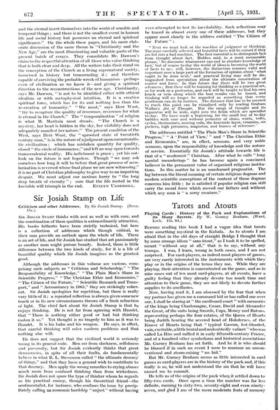Sir Josiah Stamp on Life
Criticism and other Addresses. By Sir Josiah Stamp. (Berm. 15s.).
Sia JosiAu ST.u►rr thinks with zest as well as with care, and the combination of these qualities is extraordinarily attractive. His books hitherto have been strictly technical, but here is a collection of addresses which though critical, in their sum provide an outlook upon the whole of life. There is an art of life, and Sir Josiah has studied that art passionately as another man might pursue beauty. Indeed, there is little difference between the two kinds of study, for it is a life of beautiful quality which Sir Josiah imagines as the greatest good.
Although the addresses in this volume are various, com- prising such subjects as " Criticism and Scholarship," " The Responsibility of Knowledge," " The Plain Man's Share in Scientific Progress," " The Christian Ethic and Economics," " The Citizen of the Future," " Scientific Research and Trans- port," and " Accountancy in 1965," they are strikingly coher- ent. Sir Josiah apologizes for repetition, but there is really very little of it ; a repeated reflection is always given some new touch or in its new circumstances throws off a fresh refraction of light. The chief fact about Sir Josiah Stamp is that he enjoys thinking. He is not far from agreeing with Hamlet, that " There is nothing either good or bad but thinking makes it so." Yet thought is no tragedy to him as it was to Hamlet. It is his balm and his weapon. He says, in effect, that careful thinking will solve modern problems and that nothing else will.
He does not suggest that the civilized world is seriously wrong in its general code. Men err from slackness, selfishness and perversity, but Sir Josiah evidently thinks that great democracies, in spite of all their faults, do fundamentally believe in what R. L. Stevenson called " the ultimate decency of things," and that they have a general wish to contribute to that decency. Men apply the wrong remedies to crying abuses much more from confused thinking than from wickedness. Sir Josiah does not spare the type of thinker whom he regards as his practical enemy, though his theoretical friend—the sentimentalist, for instance, who confuses the issue by precip- itately. calling an economic hardship "unjust" without having
even attempted to test its inevitability. Such reflections may be traced in almost every one of these addresses, but they appear most clearly in the address entitled " The Citizen of the Future " :
" Next we must look at the machine of judgment or thinking. The most carefully selected and beautiful facts will be ruined if they are fed into a bad machine. The first essential is to distinguish fact from thought about fact. Hobbes said, in a most memorable phrase, ' No discourse whatsoever can end in absolute knowledge of fact,' but of course to-day the world of ideas is becoming the world of facts to us ; still, however, the distinction remains valid and important over a large part of the formation of opinion about what ought to be done next,' and practical living may still be dis- tinguished from speculation about the ultimate constitution of matter and force. In that future day there will be two great advances ; first there will be training for thinking as a practical art, as for work or a profession, and each will be taught to find his own knack or vein along which the best results can be found, and thinking will no longer be regarded as something that every gentleman can do by instinct. The distance that has to be covered to reach this point can be visualized only by reading Graham Wallas's Art of Thought. But the range of thought and its apparatus will be wide, right into the fields which are specialist to-day. We have made a beginning, for the small boy of to-day babbles with ease and without pedantry of ohms, watts, volts, cycles, thermostats, moving coils, the heaviside layer, vitamins, air pockets, high pressures, magnetos, and frames of reference."
The addresses entitled " The Plain Man's Share in Scientific Progress," " A ' Point of View,' " and " The Christian Ethic and Economics," are, in effect, sermons, and very noble sermons, upon the responsibility of knowledge and the nature of service. Essentially Sir Josiah's attitude towards life is that of a " modernist " Christian. After what he calls " long mental meanderings " he has become again a convinced believer in the permanent value of organized religious institu- tions. In this matter he is an unashamed pragmatist. The lag between the literal meaning of certain religious dogmas and modern scientific conceptions of the content of those dogmas concerns him little ; he is satisfied if popular religion can still carry the moral force which moved our fathers and without which any man is a sorry creature."






































 Previous page
Previous page